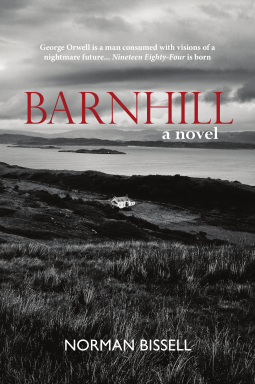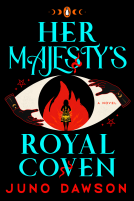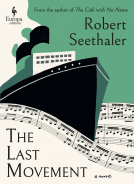
Barnhill
A Novel
by Norman Bissell
This title was previously available on NetGalley and is now archived.
Send NetGalley books directly to your Kindle or Kindle app
1
To read on a Kindle or Kindle app, please add kindle@netgalley.com as an approved email address to receive files in your Amazon account. Click here for step-by-step instructions.
2
Also find your Kindle email address within your Amazon account, and enter it here.
Pub Date Jun 28 2019 | Archive Date Aug 31 2019
Talking about this book? Use #Barnhill #NetGalley. More hashtag tips!
Description
George Orwell left post-war London for Barnhill, a remote farmhouse on the Isle of Jura, to write what became Nineteen Eighty-Four. He was driven by a passionate desire to undermine the enemies of democracy and make plain the dangers of dictatorship, surveillance, doublethink and censorship.
Typing away in his damp bedroom overlooking the garden he established and the sea beyond, he invented Big Brother, Thought Police, Newspeak and Room 101 – and created a masterpiece, widely regarded as the most significant political novel of the 20th century.
Barnhill tells the dramatic story of this crucial period of Orwell's life. Deeply researched, it reveals the private man behind the celebrated public figure – his tempestuous love life, his devotion to his baby son and his declining health as he struggled to deliver his dystopian warning to the world.
Advance Praise
'A rich, absorbing narrative that draws a convincing picture of the life of a great writer.' LEELA SOMA
'Through a literary lens, Bissell does for Orwell what Johnny Depp did for J.M Barrie in Finding Neverland. He brings the man most vibrantly alive.' ALASTAIR McINTOSH
Available Editions
| EDITION | Hardcover |
| ISBN | 9781912147878 |
| PRICE | £12.99 (GBP) |
Average rating from 11 members
Featured Reviews
 Bonnye Reed F, Reviewer
Bonnye Reed F, Reviewer
Animal Farm, published 1944, and '1984' published in 1949 are an important part of our history - novels that for most woke us to the possibilities of danger from Big Brother, ponderous government, doublespeak, and censorship - the governmental enemies of independent thought and freedoms. '1984' has been carrying this important message to readers since its first publication in 1949. Seventy years. Animal Farm has been a recurring theme for even longer.
Orwell - Eric Arthur Blair - wrote a number of other outstanding novels, his articles and essays are still relevant and his works have been published around the world, crossing language, political and religious barriers. He died before his 47th birthday of TB. Imagine his influence on the world had he not died so young.
That said, I had a difficult time getting into this novelization, partly because for several years I have avoided dystopian tales like the plague, and also , the reader has to be of the right mindset to tackle George Orwell. Optimization is not a fault he shared with the world. Unless you are brimming with good will and optimism he can bring you down into the dumps in a New York minute. Once sucked in, however, there was a lot to learn about his life, his loves, and the Scottish isles in this novel. And once in that world, you cannot put the book down. It is one I am pleased to recommend to friends and family.
I received a free electronic copy of this novelization of the final years of George Orwell - and the writing of his crucial novel, '1984' - from Netgalley, Norman Bissell, and Luath publishers. Thank you for sharing your hard work with me. I read this historical novel of my own volition, and this review reflects my honest opinion of this work.
 Philipa C, Reviewer
Philipa C, Reviewer
Big Brother, Room 101, The Ministry of Truth are all terms we're so familiar with and form part of our language. Created by author George Orwell in his novel '1984' this year sees the 70th anniversary of its publication just a year before his death from TB and this excellent fictional novel gives a good insight into his life, family and the influence of his writing through the years.
Bissell has taken the story from Orwell's point of view alongside Sonia Brownell who was a literary editor and who he married only a short time before his death. Brownell inherited Orwell's estate (much it seems to the disgust of Orwell's sister Avril who had cared for him for many years) and she made a career out of managing his legacy.
Born Eric Arthur Blair in June 1903 in India, he was the son of Richard, a rather distant military man and his mother Ida who brought Eric and his older sister Marjorie back to England when he was only one. Father and son never had a strong bond. Despite being a sickly child particularly with bronchitis, he was sent to a boarding school in Eastbourne and the effect of public schools (later Eton) on the way poorer students, like himself on a scholarship were treated differently helped to form Orwell's class and political views. He was also an avid reader and soon wrote poetry and articles (his first poem published in a newspaper when he was 11)
We meet Orwell when he is married to Eileen O'Shaughnessy in 1936 and they have survived the Spanish Civil War where he was badly injured and both were called traitors and are now living in a bomb threatened London during WWII. Orwell had spent time in Scotland with friends and seen the remote cottage called Barnhill and now wanted to take Eileen away because she was ill to escape the bombs. Eileen is ill and despite their 'open marriage' observing Orwell's many affairs they have decided to adopt a child. In fact some of the most wonderful parts of the novel and a reflection of Orwell's love for his son followed the adoption of a son in 1944 who was named Richard Horatio Blair. But family tragedy followed Orwell throughout his life alongside his loneliness and following the deaths of his mother and father, his sister Marjorie died and then tragically also Eileen.
Her death affected Orwell badly. Maybe he felt guilt over his dalliances (which were many) and his fear for the care of his son without a mother role terrified him. Luckily his sister Avril was to come to his rescue, especially when other nannies and friends either moved on or left when approached romantically by Orwell who had a habit of meeting young women and immediately asking them to marry him! He obviously found it impossible to be without a woman in his life and dreaded being on his own - despite needing such time to write.
His novel 'Animal Farm' had been published to much fanfare in 1945 and Orwell saw this as part of a trilogy and the ideas for the second obsessed him. He also felt it could only be written on the island of Jura where he would return to Barnhill cottage and be able to concentrate.
The loveliest scenes are those on the island with Orwell's time gardening, fishing and exploring the scenery, especially when his son was old enough to be beside him.. There were also some lovely scenes when Orwell is caught without transport in Glasgow over Hogmanay and soaks up the sounds, people and working class lives of the locals.
The author weaves in Sonia being the darling of London's literary and artistic scene (he doesn't come over to me as very likeable) with authors and also in France with many lovers. She was a model for Francis Bacon and lover of Lucien Freud and known as the Euston Road Venus. This contrasts so much with Orwell up on the isolated Scottish island often through wet and wintry winters and although invited by him she never did go to his beloved Barnhill.
As ill health grips Orwell will he finish 1984 and it is written as though he is struggling with the world of his main character Winston Graham alongside smoking too much and drinking dreadfully strong tea (12 teaspoons per pot!). We can almost imagine him at the typewriter with that famous first line "It was a cold day in early April, and a million radios were striking 13".
Instantly makes you want to go and read '1984' again and delve more into the life of this writer whose words still affect the world we see around us today.
 Reviewer 542987
Reviewer 542987
I love historical fiction, so it is no surprise that I really enjoyed Barnhill. I was however, very surprised by how much I did not know about the life of George Orwell. Norman Bissell uses multiple points of view to show the reader Orwell's complex and conflicted life. His need to write and to be with those he loves are often at odds with each other, as is his need to be in London with his friends and at Barnhill by himself. His poor health is always in the background and deeply affects his writing. Orwell lived at a time when he the politics of the day influenced his every thought. He had a message to share with 'humanity' that continues to shock with its prophetic qualities.
Readers who liked this book also liked:
L.M Montgomery
Children's Fiction, Comics, Graphic Novels, Manga, Teens & YA
Fumiyo Kouno
Arts & Photography, Comics, Graphic Novels, Manga, Reference












